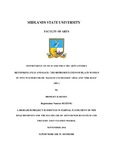Please use this identifier to cite or link to this item:
https://cris.library.msu.ac.zw//handle/11408/3989Full metadata record
| DC Field | Value | Language |
|---|---|---|
| dc.contributor.author | Karidza, Bridget | - |
| dc.date.accessioned | 2020-12-09T09:04:02Z | - |
| dc.date.available | 2020-12-09T09:04:02Z | - |
| dc.date.issued | 2016-11 | - |
| dc.identifier.uri | http://hdl.handle.net/11408/3989 | - |
| dc.description.abstract | The aim of the study was to explore the frames used in the representation of black women in two western films namely ‘The Help’ (2011) and ‘Django Unchained’ (2012). A qualitative research approach was used and data was collected through Questionnaires, Archival research and personal Observations methods. The study was also informed by Framing and Audience Reception theories. The study found out that black women are depicted as slaves and domestic workers working under white man in western films as exemplified by the two cited films. The study recommends that the film producers, writers, directors and actors should be gender sensitive when representing either men or women in films | en_US |
| dc.language.iso | en | en_US |
| dc.publisher | Midlands State University | en_US |
| dc.subject | representation | en_US |
| dc.subject | black woman | en_US |
| dc.subject | film and race | en_US |
| dc.title | Rethinking Film and Race: the representation of black woman in two western films - ‘Django unchained’ (2012) and ‘the help’ (2011) | en_US |
| dc.type | Thesis | en_US |
| item.openairecristype | http://purl.org/coar/resource_type/c_18cf | - |
| item.cerifentitytype | Publications | - |
| item.fulltext | With Fulltext | - |
| item.openairetype | Thesis | - |
| item.languageiso639-1 | en | - |
| item.grantfulltext | open | - |
| Appears in Collections: | Bachelor Of Arts In Film And Theatre Arts Studies Honours Degree | |
Files in This Item:
| File | Description | Size | Format | |
|---|---|---|---|---|
| Bridget (1).pdf | Full Text | 704.7 kB | Adobe PDF |  View/Open |
Page view(s)
98
checked on Jul 26, 2024
Download(s)
66
checked on Jul 26, 2024
Google ScholarTM
Check
Items in MSUIR are protected by copyright, with all rights reserved, unless otherwise indicated.


